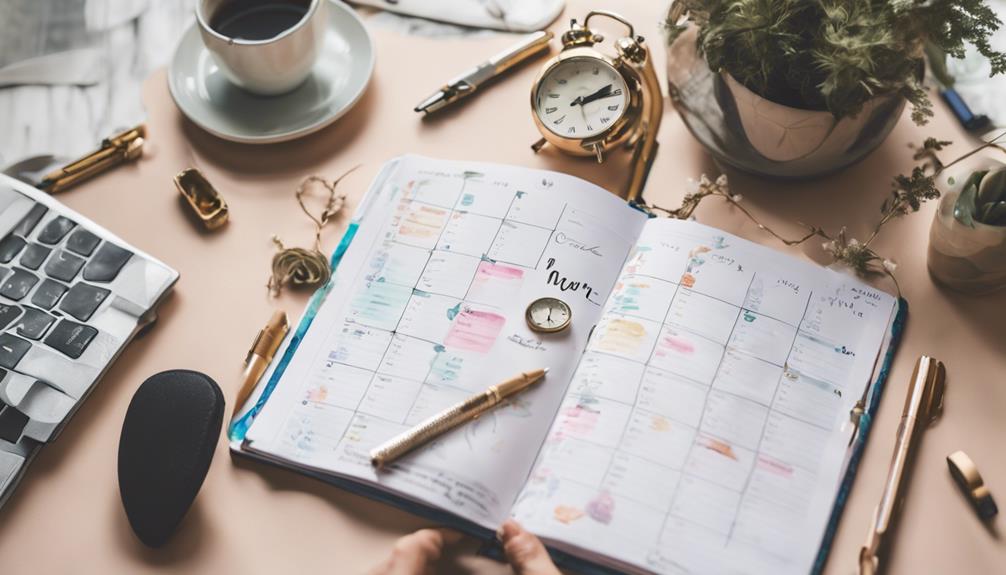Managing Anxiety and Depression: Tips for Women’s Mental Health
If you've ever found yourself feeling overwhelmed by anxiety or depression, you're not alone. Finding effective ways to manage these challenges is essential for your mental well-being. By exploring practical tips and strategies tailored specifically for women, you can equip yourself with the tools needed to navigate these complex emotions. From incorporating self-care practices to seeking professional support, each step plays a crucial role in fostering a healthier mindset. Stay tuned to discover valuable insights that can empower you on your journey towards better mental health.
Importance of Self-Care
Understanding the importance of self-care is crucial when managing anxiety and depression. Daily rituals play a significant role in nurturing your mental well-being. Establishing a routine that includes activities you enjoy, such as reading, meditating, or exercising, can provide structure and a sense of accomplishment to your day. These rituals can act as anchors, helping to ground you during turbulent times.
Emotional boundaries are also essential for maintaining your mental health. Learning to say no when you feel overwhelmed, setting limits on how much you share with others, and prioritizing your needs are all part of creating healthy boundaries. Recognize that it's okay to put yourself first and take time to recharge.
Mindfulness Practices
To effectively manage anxiety and depression, incorporating mindfulness practices into your daily routine can be incredibly beneficial. Mindfulness involves being fully present in the moment, which can help calm your mind and reduce stress. Two key techniques that can aid in this practice are breathing exercises and meditation.
Breathing Exercises
One powerful way to ground yourself is through deep breathing exercises. Simply find a quiet space, sit comfortably, and take slow, deep breaths. Focus on the sensation of your breath entering and leaving your body. This can help regulate your nervous system and bring a sense of calm.
Meditation Techniques
Meditation is a practice that encourages relaxation, focus, and awareness. Find a peaceful environment, sit or lie down, and start by focusing on your breath. Allow thoughts to come and go without judgment. This practice can enhance self-awareness and promote emotional well-being.
| Breathing Exercises | Meditation Techniques |
|---|---|
| Deep breathing | Mindfulness meditation |
| Diaphragmatic breathing | Loving-kindness meditation |
Healthy Lifestyle Habits
Incorporating healthy lifestyle habits into your daily routine can significantly impact your overall well-being and mental health. Making conscious choices regarding your exercise routine and nutrition can play a crucial role in managing anxiety and depression. Here are some tips to help you prioritize a healthy lifestyle:
- Regular Exercise: Engaging in physical activity not only benefits your physical health but also releases endorphins that can boost your mood and reduce anxiety levels.
- Balanced Nutrition Choices: Consuming a well-rounded diet rich in fruits, vegetables, whole grains, lean proteins, and healthy fats can provide your body and mind with the necessary nutrients to function optimally.
- Consistent Routine: Establishing a structured daily routine that includes time for exercise, healthy meals, and self-care activities can create a sense of stability and control, which is essential for managing anxiety and depression.
Social Support Networks
Navigating the complexities of managing anxiety and depression involves more than just focusing on personal habits and routines. Building a strong social support network can significantly impact your mental health. Engaging with online communities dedicated to mental wellness can provide a sense of belonging and understanding. These platforms offer a safe space to share experiences, seek advice, and connect with others facing similar challenges.
Peer counseling is another valuable resource within your social support network. Talking to someone who's walked a similar path can offer unique insights and empathy. Peer counselors can provide a listening ear, practical coping strategies, and emotional support during difficult times.
Cognitive Behavioral Techniques
Utilizing Cognitive Behavioral Techniques is a powerful tool in managing anxiety and depression. These techniques focus on thought restructuring and behavior modification to help you regain control and improve your mental well-being. Here are three key strategies to incorporate into your daily routine:
- Identifying Negative Thoughts: Recognize and challenge negative thought patterns that contribute to your anxiety and depression. Replace them with positive and realistic alternatives.
- Setting Behavioral Goals: Establish achievable goals to gradually expose yourself to situations that trigger anxiety. This step-by-step approach can help desensitize you to fear-inducing scenarios.
- Practicing Relaxation Techniques: Incorporate relaxation methods such as deep breathing, mindfulness, or progressive muscle relaxation into your daily schedule. These techniques can help reduce stress and promote a sense of calm.
Setting Boundaries
To effectively manage your anxiety and depression, it's crucial to establish healthy boundaries in your personal and professional life. Setting boundaries involves learning assertiveness training and emotional regulation techniques. Assertiveness training helps you communicate your needs and limits effectively, while emotional regulation allows you to manage your responses to different situations.
Establishing boundaries means clearly defining what behavior is acceptable to you and communicating this to others. It also involves recognizing when your boundaries are being crossed and taking steps to address the situation.
Time Management Strategies
Managing your time effectively is a key aspect of maintaining good mental health when dealing with anxiety and depression. When you feel overwhelmed, implementing simple time management strategies can make a significant difference in how you navigate your daily life. Here are three essential techniques to help you manage your time better:
- Prioritizing tasks: Start by identifying the most important tasks that need to be accomplished each day. Focus on completing these tasks first to reduce feelings of being overwhelmed.
- Setting goals: Establish realistic and achievable goals for yourself. Break them down into smaller, manageable steps to help you stay motivated and on track.
- Creating a routine: Establishing a daily routine can provide structure and predictability, which can be comforting when dealing with anxiety and depression.
Professional Therapy Options
If you find that time management strategies alone aren't providing the relief you need from the challenges of anxiety and depression, professional therapy options can offer additional support and guidance.
Group therapy provides a safe space to share experiences with others facing similar struggles, fostering a sense of community and understanding.
Online counseling offers convenience and accessibility, allowing you to receive therapy from the comfort of your own home.
In some cases, medication management may be recommended by a mental health professional to help regulate symptoms. It's essential to work closely with your healthcare provider to find the right balance of medication for your individual needs.
Additionally, holistic therapies like yoga, meditation, and acupuncture can complement traditional therapy approaches, promoting overall well-being and relaxation.
Relaxation and Stress Relief
When seeking relief from the overwhelming effects of anxiety and depression, incorporating relaxation techniques and stress relief practices into your daily routine can be crucial. In times of distress, finding moments to relax and unwind is essential for your mental well-being.
Here are some effective strategies to help you manage stress and promote relaxation:
- Breathing exercises: Engage in deep breathing exercises to calm your mind and body. Practice mindful breathing by taking slow, deep breaths in and out, focusing on the sensation of each breath.
- Art therapy: Explore the therapeutic benefits of art by expressing your emotions through creative outlets. Whether it's painting, drawing, or sculpting, art can be a powerful tool for processing feelings and reducing stress.
- Mindfulness activities: Incorporate mindfulness practices into your routine, such as meditation or yoga, to cultivate a sense of presence and awareness. These activities can help you stay grounded and centered amidst life's challenges.
Building Resilience Skills
To enhance your mental fortitude and better cope with the challenges posed by anxiety and depression, developing resilience skills is key. Resilience is the ability to bounce back from adversity, and it can be cultivated through various practices. One effective method is mindful breathing, which involves focusing on your breath to anchor yourself in the present moment and reduce stress. By incorporating mindful breathing into your daily routine, you can build inner strength and improve your ability to handle difficult emotions.
Another powerful tool for building resilience is using positive affirmations. Positive affirmations are statements that uplift and encourage you, helping to counter negative self-talk and boost self-esteem. By repeating affirmations such as "I am strong," "I am capable," or "I am worthy," you can rewire your brain to focus on your strengths and cultivate a more resilient mindset.
Incorporating mindful breathing and positive affirmations into your daily practice can help you strengthen your resilience skills and navigate the ups and downs of life with greater ease.
Frequently Asked Questions
How Can I Maintain Mental Health While Balancing a Full-Time Job and Family Responsibilities?
To maintain mental health while juggling work and family, prioritize self-care. Establish boundaries, delegate tasks, and schedule "me" time. Practice mindfulness, exercise, and seek support when needed. Remember, balance is key to managing stress and finding fulfillment in both your professional and personal life.
Is It Possible to Manage Anxiety and Depression Without Medication?
You can manage anxiety and depression without medication. Therapy options and lifestyle changes, like counseling and exercise, offer significant relief. Remember, "when life gives you lemons, make lemonade." You have the power to improve your mental health.
What Role Does Spirituality or Faith Play in Improving Mental Health?
Spirituality and faith can be powerful coping techniques for improving mental health. Connecting with your beliefs can provide comfort, strength, and a sense of purpose. Incorporating practices like prayer, meditation, or mindfulness can help foster inner peace and resilience.
Can Hormonal Fluctuations During Menopause Worsen Anxiety and Depression Symptoms?
Hormonal fluctuations during menopause can indeed worsen anxiety and depression symptoms. Coping strategies like mindfulness, exercise, and therapy can help manage these challenges. Understanding hormonal influence is crucial in navigating mental health during menopause.
Are There Specific Techniques to Help Cope With Seasonal Affective Disorder (Sad)?
When battling seasonal affective disorder (SAD), remember: just like a dim room, your mind needs light therapy. Try to embrace mindfulness and engage in regular exercise. Seek solace in social support; you are not alone.
Conclusion
In conclusion, by incorporating mindfulness practices, healthy lifestyle habits, and building a strong support system, you can effectively manage anxiety and depression. Remember, like a gardener tending to her garden, nurturing your mental well-being is essential for growth and resilience. Take the time to prioritize self-care, seek professional support when needed, and embrace the power of resilience to navigate through life's challenges with strength and grace. You deserve to thrive, not just survive.














